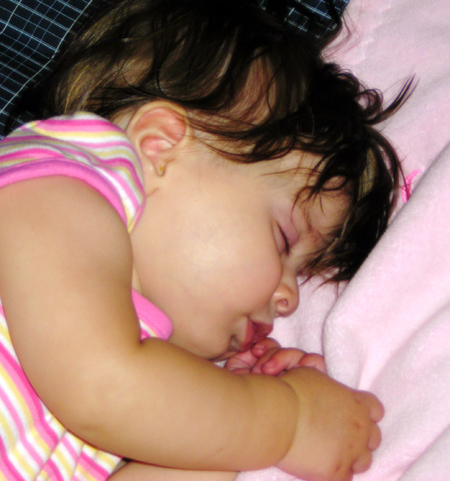I am not a large person. At 5 foot 8, I’m taller than average, but I’ve always been a healthy size and my weight gain during both my pregnancies was well within the range recommended by my doctor. My husband isn’t a big guy either.
So it was no surprise to me that both kids seemed to follow those same growth trends. Both were the same size at birth, just over seven pounds. My daughter was an ounce heavier and an inch shorter. Both were healthy. I was happy. So why were so many others concerned with their size, or lack of it?
Among the many comments I heard from mostly strangers were:
“Is your pediatrician okay with you breastfeeding?” (Of course she was.)
“When are you going to stop breastfeeding?” (None of your business.)
“Wow, my baby is the same age and he’s much bigger-was he premature?” (No, actually he was born on his due date. And hey, guess what, it’s not a contest.)
“If you give her some formula, she’ll grow more.” (Actually, she’s growing just fine, thanks.)
I got to be pretty good at brushing off the comments and ignoring the unwanted advice, but the more I looked into it, the more stories I heard about parents of breastfed babies being hassled by family members, strangers or even their own doctors about the lack of “adequate” weight gain, regardless of the size of the parents or the health of the child. Why, in the face of a childhood obesity epidemic, does bigger continue to equate with better? Why are growth charts considered to be the number one indication of a child’s health, rather than just one tool of many to assess wellness?
Consider the following:
**Ounce for ounce, breast milk contains far more naturally occurring ingredients than cow’s milk-based formula does. According to Dr. Sears, when vitamins and minerals are added to formula to compensate, it makes it harder to digest. Breastfed babies generally need to eat more often because of the easier digestibility of breast milk.
**A 1992 study at UC Davis showed that breastfed babies tend to be leaner than formula fed babies. Specifically, while weight gain for each group was similar, the breastfed babies had a lower weight for length ratio.
**Many doctors in the USA are still using the charts from 1977, which are based on decades of measurements of actual children, most of whom were formula fed. The CDC updated the US growth charts in 2000, and these charts can be used to track the growth of exclusively breastfed infants, but don’t take into account how breastfed babies tend to grow. In 2006, the WHO published growth charts that represent healthy breastfed babies, but many doctors don’t use them.
While both my kids are at the bottom of the US growth charts, they score significantly higher on the WHO charts. In addition, while small, both mostly stayed on the same growth trajectory as they got older. While my son did have a milk protein allergy, removing any traces of milk from his diet fixed his symptoms. And two years later when my daughter was born and she grew in almost the exact same way her brother did, without a milk protein allergy to complicate or slow things down, I didn’t worry. She was healthy, and was just growing the way her genes had programmed her to do.
Still, I wondered. Are breastfed babies doomed to be the shorter members of their classes, simply because of how their mother’s choose to feed them? Out of curiosity, I posted a poll on my personal blog, titled “How Large or Small Were Your Children On The Growth Chart?” 30 people voted and the results looked like this.
I breastfed and my babies were smaller than average. (5/30-16%)
I breastfed and my babies were larger than average. (11/30-36%)
I breastfed and my babies were average size. (8/30-26%)
I formula fed and my babies were smaller than average. (1/30-3%)
I formula fed and my babies were larger than average. (4/30-13%)
I formula fed and my babies were average size. (3/30-10%)
I didn’t know what to expect from the poll, but the results show one thing candidly–babies come in all shapes, sizes and weights, regardless of how they are fed. Yes, both my children were little, but it wasn’t because they were breastfed or because there was anything wrong with my breast milk.
Both kids are older now, and they remain small. My almost three year old is a twenty-five pound bundle of energy that eats anything that doesn’t eat her first. At my son’s recent five-year well child visit, his BMI categorized him as underweight, but his pediatrician isn’t concerned. He did gain both weight and height over the past year, is rarely sick, is meeting or exceeding his milestones. He’s just on the skinny side–just like his dad, his grandfather and other assorted male family members.
How about you? How were your breastfed babies sized, and did anyone hassle you about it?

 I slipped into the apartment at 5 pm, kicked off my sandals, and looked around. “Where’s the baby?” I asked my husband.
I slipped into the apartment at 5 pm, kicked off my sandals, and looked around. “Where’s the baby?” I asked my husband.